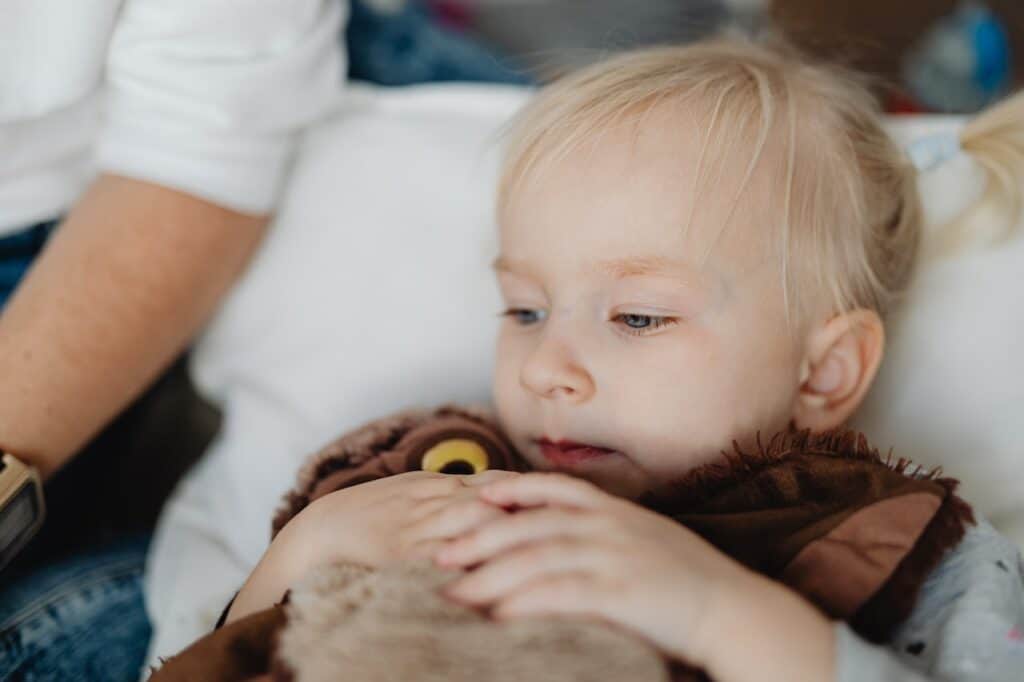It can be a difficult and emotional experience for you as a new parent when you feel like my baby doesn’t like me. This feeling can be especially distressing for mothers who may feel like they are failing at their role as a caregiver. However, it is important to understand that a baby’s behavior is not a reflection of how they feel about their parent.
Understanding Your Baby’s Behavior Babies are not capable of intentionally liking or disliking someone. They are simply responding to their environment and their basic needs for food, comfort, and safety. It is common for babies to go through phases where they seem to prefer one caregiver over another, but this is usually temporary and can be attributed to a variety of factors.
The Role of Genetics in Baby’s Behavior While a baby’s behavior is largely influenced by their environment and experiences, genetics can also play a role. Some babies may be naturally more fussy or difficult to soothe, while others may be more easy-going. It is important to remember that these traits are not a reflection of the parent’s abilities or actions.
Key Takeaways
- A baby’s behavior is not a reflection of how they feel about their parent.
- Genetics can play a role in a baby’s behavior, but it is not a reflection of the parent’s abilities.
- Understanding a baby’s behavior and responding to their needs is key to building a strong bond.
Understanding Your Baby’s Behavior
Babies are complex beings, and their behavior can be difficult to interpret for new parents. However, understanding your baby’s behavior is crucial for building a strong relationship with them. This section will cover two important aspects of understanding your baby’s behavior: interpreting crying and gestures, and the importance of eye contact.
Interpreting Crying and Gestures
Crying is a baby’s primary mode of communication, and it can mean many things. It’s important to note that not all crying is a sign of distress. Sometimes babies cry because they’re hungry, tired, or simply want attention. Other times, crying can be a sign of discomfort or pain.
Gestures are another important way that babies communicate. They may wave their arms and legs, make facial expressions, or turn their heads to indicate what they want or need. Paying attention to your baby’s gestures can help you better understand their needs and respond appropriately.
Importance of Eye Contact
Eye contact is an important part of building a bond with your baby. It helps them feel seen and understood, and it can also help them develop social skills. Making eye contact with your baby during feedings, diaper changes, and playtime can help strengthen your relationship and build trust.
However, it’s important to note that some babies may not make eye contact as frequently as others. This doesn’t necessarily mean that they don’t like you or that something is wrong. Some babies simply take longer to develop social skills, and others may be more sensitive to eye contact.
In conclusion, understanding your baby’s behavior is key to building a strong relationship with them. By interpreting their crying and gestures and paying attention to the importance of eye contact, you can better understand their needs and respond appropriately.
The Role of Genetics in Baby’s Behavior

Understanding Dominant and Recessive Genes
Genetics plays a crucial role in determining a baby’s behavior and personality traits. The genetic information is passed down from the parents to the child through DNA. The DNA is made up of genes, which are responsible for the traits that the baby inherits from the parents. These genes come in pairs, with one allele inherited from each parent.
Dominant genes are those that are expressed even if only one copy is present. Recessive genes are those that are only expressed if two copies are present. For example, if a baby inherits a dominant gene for curly hair from one parent and a recessive gene for straight hair from the other parent, the baby will have curly hair as the dominant gene is expressed.
Influence of Hair and Eye Color
Hair and eye color are two traits that are determined by genetics. The genes responsible for these traits are located on different chromosomes. Hair color is determined by the amount and type of melanin produced by the hair follicles. The dominant gene for hair color is brown, while the recessive gene is blond. If a baby inherits two copies of the recessive blond hair gene, the baby will have blond hair.
Eye color is determined by the amount and type of melanin in the iris of the eye. The dominant gene for eye color is brown, while the recessive gene is blue. If a baby inherits two copies of the recessive blue eye gene, the baby will have blue eyes.
In conclusion, genetics plays a significant role in determining a baby’s behavior and personality traits. Understanding the basics of genetics, such as dominant and recessive genes, can help parents understand why their baby may behave in a certain way. Hair and eye color are just two examples of how genetics can influence a baby’s physical appearance and traits.
Importance of Bonding with Your Baby
Bonding with your baby is an essential aspect of parenting. It involves building a strong connection with your child, which can help promote their emotional, social, and cognitive development. In this section, we will discuss the importance of bonding with your baby and the role of skin-to-skin contact in building a strong parent-child relationship.
The Role of Skin-to-Skin Contact
Skin-to-skin contact is a powerful way to bond with your baby. It involves placing your baby on your bare chest, allowing them to feel your warmth and heartbeat. This type of contact can help regulate your baby’s body temperature, breathing, and heart rate, and it can also promote the release of hormones that help your baby feel calm and secure.
Studies have shown that skin-to-skin contact can have numerous benefits for both parents and babies. For example, it can help reduce stress levels, promote breastfeeding, and improve sleep quality. It can also help parents feel more confident and connected to their baby, which can lead to a stronger parent-child relationship.
Building a Strong Parent-Child Relationship
Building a strong parent-child relationship is essential for your baby’s overall well-being. It involves creating a safe and nurturing environment where your baby can develop a sense of trust and security. This can help promote healthy emotional, social, and cognitive development, and it can also help your baby feel more confident and self-assured as they grow older.
To build a strong parent-child relationship, it’s important to spend quality time with your baby. This can involve playing, reading, singing, or simply cuddling with them. It’s also important to be responsive to your baby’s needs and cues, such as when they’re hungry, tired, or in need of a diaper change. By responding to your baby’s needs in a timely and nurturing way, you can help build a strong foundation for your relationship.
In conclusion, bonding with your baby is a crucial aspect of parenting. It involves building a strong connection with your child, which can help promote their emotional, social, and cognitive development. Skin-to-skin contact and spending quality time with your baby are both essential components of building a strong parent-child relationship. By prioritizing bonding with your baby, you can help ensure that they grow up feeling loved, supported, and secure.
The Impact of Hormones on Baby’s Behavior

Understanding the Role of Hormones
Hormones play a crucial role in the behavior of babies. Hormones are chemical messengers produced by the endocrine glands that regulate various bodily functions, including growth, development, and behavior. Hormones also influence the emotional and cognitive development of babies.
One of the most important hormones that affect the behavior of babies is oxytocin. Oxytocin is a hormone produced by the hypothalamus and released by the pituitary gland. It is commonly known as the “love hormone” because it is associated with bonding, social interaction, and trust.
When a baby is born, the mother’s body releases oxytocin, which helps to promote bonding and attachment between the mother and the baby. Oxytocin also helps to regulate the baby’s stress response and promotes relaxation, which can help to soothe the baby.
Another hormone that plays a role in the behavior of babies is cortisol. Cortisol is a hormone produced by the adrenal glands in response to stress. When a baby is exposed to stress, such as separation from the mother or a loud noise, the body releases cortisol, which can cause the baby to become agitated and upset.
In addition to oxytocin and cortisol, other hormones, such as testosterone and estrogen, can also affect the behavior of babies. Testosterone is a hormone that is typically associated with male development, and it can influence the development of male-typical behaviors, such as aggression and dominance. Estrogen, on the other hand, can influence the development of female-typical behaviors, such as nurturing and caregiving.
Overall, hormones play a critical role in the behavior of babies. Understanding the role of hormones can help parents to better understand their baby’s behavior and respond appropriately to their needs.
Feeding and Your Baby’s Behavior
The Connection between Breastfeeding and Baby’s Behavior
Breastfeeding is a crucial part of a baby’s development and can have a significant impact on their behavior. Babies who are breastfed tend to be more content and less fussy than those who are not. This is because breast milk contains all the nutrients a baby needs and is easier for them to digest than formula.
Breastfeeding also promotes bonding between mother and baby, which can help to reduce stress and anxiety levels in both. This bond is created through skin-to-skin contact and the release of hormones such as oxytocin, which is often referred to as the “love hormone.”
Research has shown that breastfed babies may be less likely to develop behavioral problems later in life. This is because breast milk contains antibodies that help to protect against illness, reducing the risk of infections that can cause irritability and discomfort.
It is important to note that breastfeeding is not always easy, and some mothers may struggle with it. It is essential to seek support from a lactation consultant or healthcare provider if you are experiencing difficulties.
In summary, breastfeeding can have a positive impact on a baby’s behavior, promoting bonding and reducing the risk of illness. Seeking support if you are struggling with breastfeeding is essential to ensure that both you and your baby are healthy and happy.
Physical Attributes and Behavior

How Height and Bone Structure Can Affect Behavior
Physical attributes such as height and bone structure can have an impact on a baby’s behavior towards their caregiver. Research suggests that taller babies tend to be more confident and independent, while shorter babies may be more clingy and dependent on their caregivers. However, it is important to note that there is no one-size-fits-all approach when it comes to a baby’s behavior.
Bone structure can also play a role in a baby’s behavior. For example, babies with a wider bone structure may have a more assertive personality, while those with a narrower bone structure may be more introverted. Again, it is important to remember that these are generalizations and every baby is unique.
It is important for caregivers to understand that a baby’s behavior is not solely determined by their physical attributes. Other factors such as temperament, environment, and experiences also play a significant role in shaping a baby’s behavior.
Caregivers should focus on building a strong and nurturing relationship with their baby, regardless of their physical attributes. This can be achieved through consistent and responsive caregiving, positive reinforcement, and creating a safe and stimulating environment for the baby to explore and learn in.
In conclusion, physical attributes such as height and bone structure can have an impact on a baby’s behavior, but it is important to remember that every baby is unique and there are many other factors that contribute to their behavior. Caregivers should focus on building a strong and nurturing relationship with their baby to promote healthy development.
Concerns and How to Address Them
1. Giving Your Baby Undivided Attention
One of the most common reasons why a baby may not seem to like their parent is if they feel neglected or ignored. It is important for parents to give their babies undivided attention whenever possible. This means putting away distractions such as phones or other devices and focusing solely on interacting with the baby.
One way to provide undivided attention is through playtime. Parents can engage in activities that encourage bonding and interaction, such as reading books, playing games, or singing songs. It is important to follow the baby’s cues and interests during playtime, as this can help build trust and strengthen the parent-child relationship.
Another way to provide undivided attention is through physical touch. Babies crave physical contact and it can help them feel secure and loved. Parents can hold, cuddle, and snuggle with their babies throughout the day, and especially during times when the baby seems upset or fussy.
2. Addressing Parental Concerns
It is common for parents to feel worried or concerned if their baby does not seem to like them. However, it is important to remember that babies are still developing their social and emotional skills, and may not always express their feelings in a way that is easily understood.
One way to address parental concerns is to seek support from other caregivers or professionals. This can include talking to a pediatrician, joining a parenting group, or seeking therapy. These resources can provide guidance and reassurance to parents who may be feeling overwhelmed or uncertain.
It is also important for parents to practice self-care and prioritize their own mental and emotional well-being. This can include taking breaks when needed, seeking out hobbies or activities that bring joy, and finding ways to manage stress and anxiety.
Overall, addressing concerns and providing undivided attention can help strengthen the parent-child relationship and promote healthy development for the baby.
Related Post: Autism and Cuddling: Understanding Why Your Baby May Not Enjoy It
Frequently Asked Questions
How can I improve my relationship with my baby?
There are many ways to improve your relationship with your baby. Spending quality time with them, talking to them, reading to them, and playing with them are all great ways to bond with your baby. It’s also important to respond to their needs promptly, show them affection, and be consistent in your care.
Why might a baby not appear to like someone?
Babies are individuals and can have different preferences when it comes to people they feel comfortable with. Sometimes, a baby may not appear to like someone if they are not familiar with them, if they have had negative experiences with them, or if they are picking up on negative emotions from the caregiver.
What are some signs that a baby doesn’t feel attached to their caregiver?
Some signs that a baby may not feel attached to their caregiver include not seeking comfort from them, not making eye contact, not smiling or responding to their caregiver’s attempts to interact, and not showing any signs of distress when separated from them.
How can I bond with my baby?
Bonding with your baby can be done in many ways. Some tips include spending quality time with them, talking to them, reading to them, and playing with them. It’s also important to respond to their needs promptly, show them affection, and be consistent in your care.
What can I do if my baby seems to prefer someone else?
If your baby seems to prefer someone else, it’s important not to take it personally. Babies can have different preferences when it comes to people they feel comfortable with. You can try spending more quality time with your baby, engaging in activities they enjoy, and being consistent in your care.
Is it normal for a baby to show a preference for one caregiver over another?
Yes, it is normal for a baby to show a preference for one caregiver over another. Babies are individuals and can have different preferences when it comes to people they feel comfortable with. It’s important to remember that this preference may change over time and that it’s important to continue to build a strong relationship with your baby.

Iesha is a loving mother of 2 beautiful children. She’s an active parent who enjoys indoor and outdoor adventures with her family. Her mission is to share practical and realistic parenting advice to help the parenting community becoming stronger.
